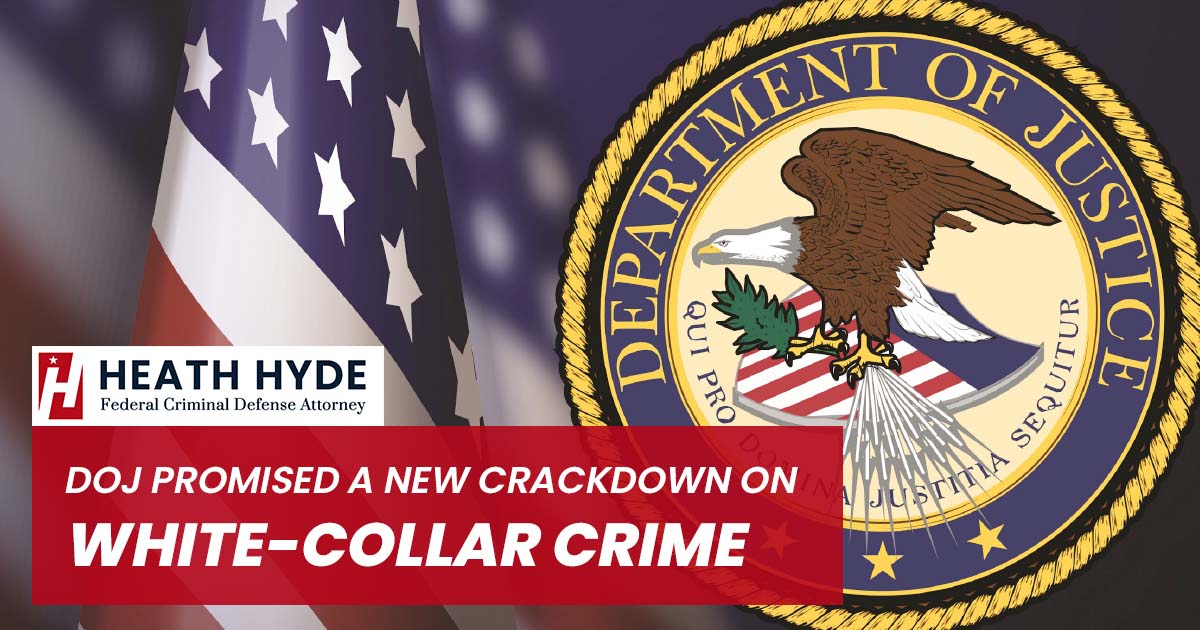White-collar crime prosecutions have decreased in recent years. The Department of Justice, on the other hand, has recently signaled its determination to crack down on corporate crimes.
In an interview in October, Deputy Attorney General Lisa Monaco stated that she intends to reverse the Trump administration’s apparent backsliding on prosecuting financial crimes such as fraud. According to recent data, the Biden administration has continued to reduce prosecutions.
During the Trump administration, white-collar investigations and prosecutions dropped to an all-time low.
The Justice Department has promised to step up its efforts to combat white-collar crime. The department is expected to deploy a new squad of FBI agents entrenched in the fraud division, as well as more active preventive measures.

According to Bloomberg, Monaco promised a daring strategy that would boost individual accountability in the boardroom. Many white-collar cases are difficult to investigate, complex, and resource-intensive, according to Monaco.
Monaco promised, “We would go after individuals regardless of their status.” “Those who are responsible will be held accountable.”
Companies will be urged to work with investigators on concerns of misconduct and possible white-collar crime. Companies should have “vigorous and strong compliance programs,” according to Monaco.
White-Collar Crime Prosecutions Decreased
White-collar crime prosecutions have been progressively declining in recent years. According to the Transactional Records Access Clearinghouse at Syracuse University, projected figures for white-collar prosecutions in 2021 show a continued reduction over the last 20 years.
According to the TRAC analysis, which analyzes Department of Justice data, the federal government reported 3,545 new white-collar criminal prosecutions in the first nine months of fiscal 2021. If the current pace of white-collar prosecutions continues, the total for the year will be 4,727.
The long-term tendency is really positive. According to government statistics, there were 10,162 white-collar prosecutions in 2011 and 9,507 in 2001, down 53.5 percent and 50.3 percent, respectively. Although the Trump era is connected with fewer prosecutions, the numbers indicate a longer-term trend.
Despite the decrease in prosecutions, the consequences for white-collar crimes such business fraud, tax evasion, embezzlement, and money laundering are still severe. In Texas, these are significant offenses. If you’ve been charged with a white-collar crime in Texas, never rely on the company’s legal counsel. Many of these difficult cases have been handled by our Dallas-based white-collar criminal defense team, and we’ve had great success. Please contact Heath Hyde today: Call 903.439.0000.
In an updated article authored by Harper Neidig at The Hill released April 24, 2022, the Justice Department again pledges a “crackdown” on white-collar crime claiming the Trump administration promoted a historic decline in law enforcement efforts targeted at white-collar crime, especially fraud, during its tenure.
In support of this white-collar crime intensification initiative, in a series of speeches since November, top DOJ officials have warned white-collar defense attorneys that prosecutors will be less willing to offer leniency to repeat corporate offenders and more aggressive in investigating wrongdoing.
“Corporate crime weakens our economic institutions by undermining public trust in the fairness of those institutions,” Attorney General Merrick Garland said in a speech last month to the American Bar Association’s Institute on White Collar Crime.
“Failing to aggressively prosecute such crimes weakens our democratic institutions by undermining public trust in the rule of law,” added Garland, who said the essence of the law was to treat cases equally so there was not one rule for the rich and powerful and another for the poor and powerless.
“To fail to aggressively prosecute corporate crime leads citizens to doubt that their government adheres to this principle. The Justice Department does not intend to fail,” he said.
The DOJ’s new commitment has been encouraging to advocates, though many remain skeptical that the DOJ will put muscle and money behind its rhetoric.
“There’s been a meaningful shift in the way DOJ talks about corporate crime,” said Rick Claypool, the research director for the nonprofit advocacy group Public Citizen. “But what they can do [to show they’re serious] is start prosecuting cases.”
Claypool said the Trump administration was “bending over backward” to avoid cracking down on corporate America, which will make the new DOJ’s job tougher.
“They have got quite a hill to climb,” he said. “And it’s likely the case that because of the Trump administration’s policies, they’re even further behind than they seem because these cases take a long time to investigate and prosecute.”
Deputy Attorney General Lisa Monaco issued a memo in October announcing policy changes for charging and punishing corporate crime. It largely restored late Obama-era practices that placed a greater emphasis on seeking individual accountability in cases of corporate wrongdoing.
Those practices, implemented by Monaco’s predecessor Sally Yates in 2015, went largely untested as the Trump administration revised them.
Monaco, who helped lead the federal prosecution of Enron executives, said she learned from that experience the need for prosecutors to seek individual accountability at the top when they encounter corporate cultures of “greed and hubris.”
“Accountability, in the form of bringing individuals to justice and prosecuting senior leaders, I think, is very, very important because it goes to the core of faith in our system of justice,” she said last week in a virtual discussion with the Ethics & Compliance Initiative.
Researchers have struggled to accurately and comprehensively quantify federal law enforcement’s white-collar prosecutions. Part of the difficulty is that the DOJ does not have a designated category for “white-collar crime,” and such cases can involve violations of a wide range of law, including environmental, labor, tax, antitrust, fraud and bribery.
The Transactional Records Access Clearinghouse (TRAC) at Syracuse University, which has been measuring the DOJ’s efforts, has registered a steady decline in white-collar prosecutions since a recorded high of more than 10,000 in 2011.
According to TRAC’s data, the yearly total dipped below 6,000 for the first time in 2017, the first year of the Trump administration, and has yet to reach that level again since.
Brandon Garrett, a law professor at Duke University, found a sharp decline in the total amount of fines and the number of prosecutions against financial institutions and publicly traded companies from the last 20 months of the Obama administration to the first 20 months of the Trump administration.
Garrett said the Biden administration’s new policies alone won’t do much to reverse recent trends and that a serious effort to impose accountability will require resources and a shift in priorities.
“The letter of the policies don’t matter quite as much as just the dedication and resources that are put into corporate prosecutions,” he said.
“Building a serious unit creates the kind of resources you need to do long-term and complex investigations,” Garrett added. “And it also means that you’re going to have cases that progress for years and you’re going to be more insulated from the sort of passing of whims of the politically appointed leadership from one term to the next. Therefore, expanding long-term hires and building a larger, more serious group of people who focus on corporate cases is much needed.”
If you feel you may have exposure to white-collar investigation by the new force coming from the Justice Department, contact Heath Hyde to begin preparing an appropriate strategy to avoid investigation and derail potential prosecution early. It is never to early to work to avoid a federal criminal investigation if you have any concern about potential exposure. Contact Heath Hyde: Call 903.439.0000 and arrange your free confidential case consultation. Heath Hyde believes being proactive with the Justice Department is the first step in ensuring potential exposure is minimized.
For more information, see:






